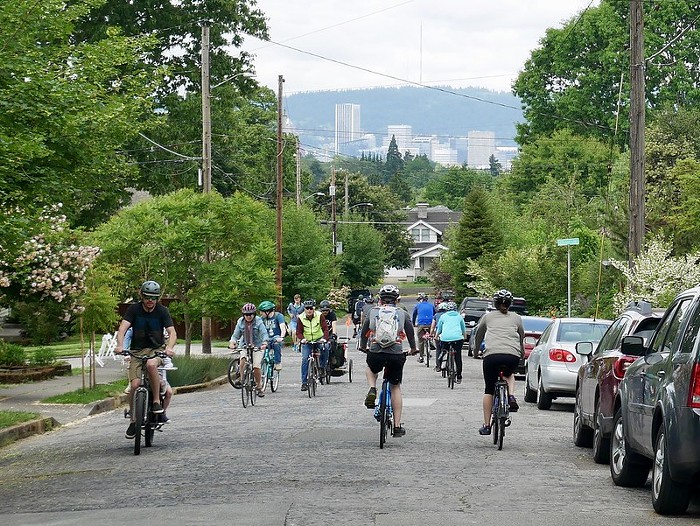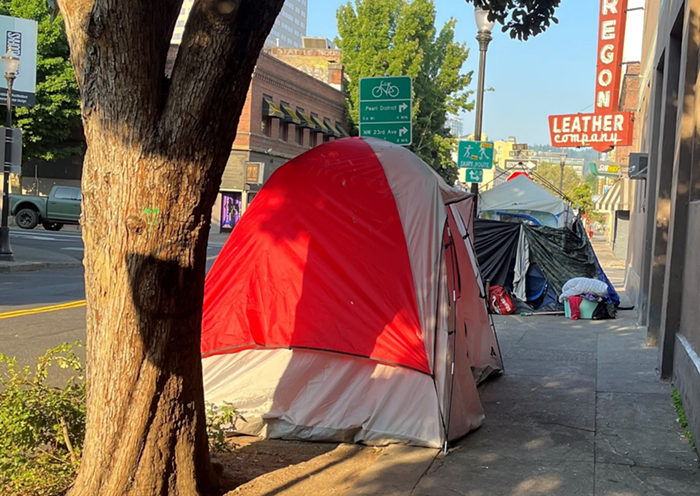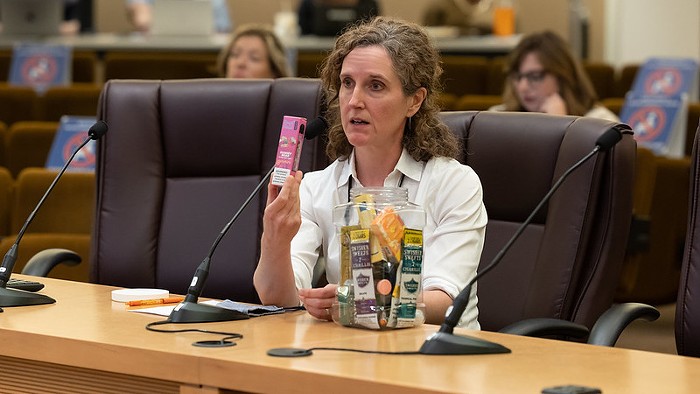When Portland police officers fire their gun at a member of the public, it’s city policy to publish that officers’ name within 24 hours. Lately, that hasn’t been the case. In July, after officers shot and killed a man who was firing a gun in a Southeast Portland yard, Portland Police Bureau (PPB) chose to withhold the identities of the officers responsible, citing threats of “doxing.”
Doxing, or the act of sharing the home address and other personal information of someone online to prompt harassment of that person and their family, has become a growing concern for members of law enforcement, especially on the heels of nationwide protests against police violence. During Portland’s 2020 protests, PPB attempted to prevent doxing of its officers who interacted with (and, in many cases, injured) demonstrators on the ground by covering officers’ name badges with tape and identifying them with a number.
While officers have since been forced by a judge to display their names on their uniforms, it appears the police bureau is turning to a new technique to shield officers who use force against the public from being identifiable. Whether it's a short-term fix or the start of a more permanent policy remains to be seen.
A month after the July shooting, PPB announced that they’d also be withholding the names of three other officers who shot at a Portlander on August 16, again citing doxing concerns. PPB pointed out a loophole in city policy regarding officer identification following a shooting, which allowed the bureau to withhold the name if there was a “credible security threat.”
The bureau also announced that the Federal Bureau of Investigations (FBI) had been tapped to investigate these threats.
“PPB will release the name of the members involved in the shooting when the threat no longer exists,” read a press release from PPB. As of September 1, the officers remain anonymous. PPB declined to comment on what threats may have prompted the investigation, but PPB spokesperson Kevin Allen clarified:"This is not arbitrary decision."
The Portland Police Association (PPA), which represents rank-and-file PPB officers, applauded this decision and pushed for it to become a permanent city policy.
“While I am encouraged by this posture shift towards recognizing the real dangers facing our public servants, these protections should endure,” wrote PPA President Aaron Schmautz on the union’s Facebook page. “Moving forward, the identities of officers involved in critical events should be sealed until such a time that context can be provided through transparent release of investigations and steps can be taken to ensure the safety of the officers and their families.”
This response is particularly confusing to Representative Janelle Bynum. That’s because, in 2021, Bynum was lobbied by law enforcement groups across Oregon to pass a law that addressed this exact concern.
Prior to the 2021 legislative session, a constituent of Bynum’s Clackamas County district invited Bynum over to chat in her backyard. The woman, a spouse of a police officer, shared with Bynum her concerns about people threatening her family because of her husband’s career. She had heard of people sharing the home addresses of local officers online to prompt harassment, and was terrified her family was at risk. It wasn’t the first time Bynum had heard of the concern—she had also been contacted by the then-President of the PPA Daryl Turner, about a similar unease among the members of his union.
The conversations led to her creating a legislative work group to address the concern and, ultimately, passing a bill that directly addressed doxing. The work group also passed legislation that limited law enforcement agencies from sharing mugshots of people they arrest—a tradition many characterized as state-backed doxing. The resulting anti-doxing law, endorsed by statewide sheriff and police chief associations, allows individuals to sue people who disclose private information about someone “with the intent to stalk, harass or injure” that person.
“We wrote the bill at the request of the police,” said Bynum. “We know that you can’t recruit the best officers if people feel like doing that job puts their family at risk. On the flip side, people will not trust you if you indiscriminately kill people and are not held to account.”
The Portland city attorney’s office, which can represent PPB officers threatened with harassment, has not moved to use this new law to litigate the recent doxing threats.
“We’re aware of the statute and would consider using it under appropriate circumstances,” said City Attorney Robert Taylor.
Bynum said she hasn’t received any feedback from the city of Portland or the PPA since the law passed to express that the law isn’t working for them—which is why she believes their recent statements around doxing are more an “Human Resources move” to empower employees than anything. Bynum also characterized PPB’s response as a way to signal that police officers are above the law.
“It shows that they have more tools than the average person has when they shoot people,” said Bynum. “That’s not how you’re going to restore trust in law enforcement.”
Attorney Juan Chavez, who serves as the director of the Civil Rights Project at the Oregon Justice Resource Center, echoed Bynum’s analysis.
“These are people who go out into the public every day and the public deserves to know who amongst them have killed people,” said Chavez. “That level of protection, that’s not something that’s afforded to any of us. It’s the police thumbing their noses and saying ‘We’re above you’.”
Chavez said that state laws should be able to address whatever doxing concerns the police have, whether that’s by using the new civil process laid out in Bynum’s law or by charging someone with harassment. Choosing to conceal officers’ identities rather than rely on the justice system creates a standard that side-steps the kind of transparency and accountability the city has asked of its police force, Chavez added.
Both Chavez and Bynum shared concerns that this new policy would become the new status quo for Portland police—and a new reason for the public to distrust law enforcement.
It’s no secret that Portlanders’ trust in their police force is low, whether that’s due to the way officers treated protesters in 2020 or officers’ slow response times to 911 calls. It doesn’t help that the US Department of Justice has put the city on blast for failing to adhere to their own policies during the 2020 protests, a slip-up that nudged PPB out of compliance with a decade-old settlement agreement with the feds in 2021.
Mayor Ted Wheeler acknowledged this distrust himself during a Wednesday City Council meeting, where he agreed with a speaker’s assertion that the public doesn’t trust police.
“Trust is earned,” said Wheeler, directing his statement to PPB Chief Chuck Lovell. “And the way you earn trust is…communication.”
Yet, in a statement emailed to the Mercury Thursday, Wheeler backed the decision of the PPB to stay silent on their officers’ identities.
“Our values, and the law, require us to balance the important need for transparency along with the safety of those involved with high-profile public safety incidents while the evidence is being gathered and analyzed,” Wheeler wrote. “For example, on a case-by-case basis, there are many instances where the names of suspected individuals are not released for ongoing investigations. We will continue to strive to strike that balance.”
Both Portlanders shot by police in the recent incidents where officers’ names have been withheld have had their names published by PPB.




















